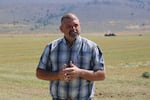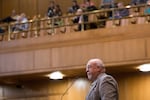Two Republican state lawmakers from Eastern Oregon are pushing Oregon Gov. Kate Brown to allow broad exemptions for health care workers, teachers and other state employees who will soon have to show proof of COVID-19 vaccination or a documented exception to keep working.
Last week, Rep. Mark Owens, R-Crane, and Sen. Lynn Findley, R-Vale, publicized sending Brown a letter opposing the mandate set to take effect Oct. 18. The legislators argued in a press release that the rule is a “gross overreach of authority,” and if enforced would lead to closing some rural schools, hospitals and emergency services.
“We’re going to lose some of those folks because they don’t want to be told what to do,” Findley said in an interview this week. “I don’t think it’s a partisan issue. It’s distrust of government in a lot of frontier Oregon.”
The vaccine mandates are laid out in an executive order affecting state employees, and in Oregon Health Authority rules applying to K-12 school employees and health care workers. All three requirements allow documented medical and religious exceptions.

Rep. Mark Owens, R-Crane, pictured in Harney County on August 27, 2021. Owens said he thinks Gov. Kate Brown's vaccine mandates will backfire in the long run, and will further entrench vaccine skeptics.
Emily Cureton Cook / OPB
Findley said he would likely support people rejecting mandated shots for any reason.
Some elected and public health leaders from across Eastern Oregon have backed the stance. Health department directors in Grant and Harney counties sent the governor a letter pleading for a different approach in counties with populations under 50,000.
“We simply do not have the manpower or time to terminate vital healthcare workers and train replacements when we are combating the rise in cases,” reads the letter.
According to Brown spokesman Charles Boyle, the goal of the mandate is to keep schools, businesses and communities open.
“People are dying right now when we have safe, effective, and free vaccines readily available. The Governor is responding to a public health crisis,” Boyle wrote in an email. “Elected officials should be calling on their constituents to wear masks and get vaccinated.”

A 2019 file photo of State Rep. Lynn Findley, R-Vale, on the House floor in Salem, Ore.
Bradley W. Parks / OPB
The state provided frequently asked question sheets for health care workers and K-12 workers who wanted to learn more about the mandate.
Many of the sickest people in rural Oregon go to St. Charles Bend, which is now relying on support from Oregon National Guard troops and about 130 traveling nurses and respiratory therapists contracted by the Oregon Health Authority. As of Thursday, nearly a third of the health system’s beds were filled with COVID positive patients, 83% of whom were unvaccinated.
The state’s goal to have 80% of adults vaccinated lags most dramatically in rural counties. Of the 10 counties with the lowest vaccination rates in Oregon, half are represented by Findley or Owens. In these five counties — Baker, Grant, Harney, Malheur and Lake — 113 people have died from COVID-19 since the pandemic began, while more than half the adult population remains unvaccinated, per state data.
Owens said he thinks Brown’s mandate will backfire in the long run, and further entrench vaccine skeptics.
In mid-August, he and Findley sent the state Legislature’s attorneys a list of questions focused on the exemption process, and suggested the state could be liable for vaccine injuries.
“The questions are still unanswered,” Owens said Wednesday.
In a joint interview, he and Findley said they were not aware of a single vaccine injury reported in their districts so far.
Both of the legislators said they got vaccinated soon after the shots were available.
“I received my vaccination three days after my age group was eligible,” Findley said. “I have not run on top of soap boxes yelling and screaming, pointing to the vaccinations. I’ve been supporting it, but not as publicly as I perhaps could, or should, and will be in the future.”

In an OPB file photo from January 2021, Dr. Jane Birschbach, MD, right, administers the COVID-19 vaccine to Barrett Flesh at the Deschutes County Public Health Department in Bend, Ore.
Bradley W. Parks / OPB
